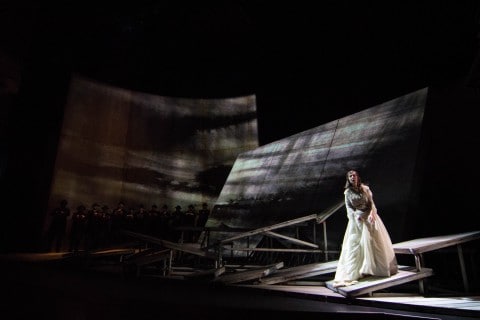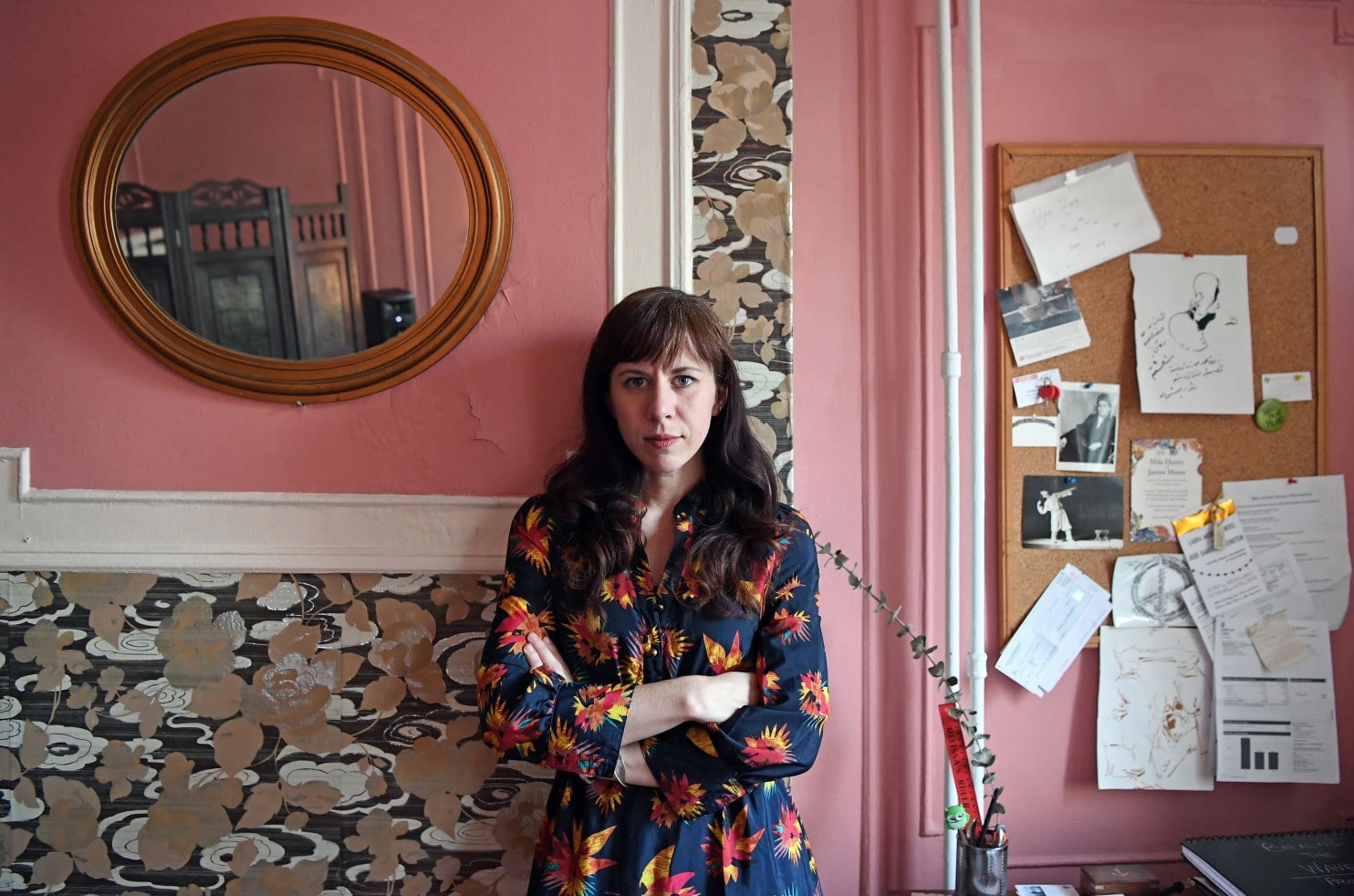Steeped in Guns N’ Roses and Philip Glass, Missy Mazzoli is a leading composer of her generation
By Anne Midgette
For Christmas this year, Missy Mazzoli’s aunt knitted her a black sheep. It was an affectionate gesture. Mazzoli, 37, is one of the top composers of her generation, but to a family of non-musicians in Lansford, Pa., a small town about an hour from Philadelphia, her career seems to have come out of left field. Mazzoli’s early musical predilections ran to the video of “November Rain” by Guns N’ Roses (“I was obsessed with the drama of it,” she says). As for fitting in: “My family are all special-ed teachers,” she says, laughing, pleased rather than put off by the gift.
In the new music world, however, Mazzoli is less a black sheep than a sacred cow: an “it” girl of the contemporary scene. Seven or eight years ago, she started making waves with her chamber-ensemble-cum-girl-band, Victoire, a group with a funky alt-classical vibe that she formed as an outlet for performing her own music. Listening to the band’s post-minimalist drones overlaid with expressive spasms of melody in an electronic haze, playing at the Atlas on H Street in 2011, you might not have guessed that Mazzoli’s work was going to veer into the world of mainstream opera. But on Friday, the Washington National Opera will be presenting the world premiere of her third opera, a 70-minute piece called “Proving Up,” and the opera world counts the company lucky to get it.
“Proving Up,” which Mazzoli wrote with the prolific librettist Royce Vavrek, based on a short story by Karen Russell (“Swamplandia”), is the latest entrant in the lists of WNO’s American Opera Initiative commissions. Now in its sixth year, the initiative involves three 20-minute chamber operas (this year’s trio will be performed on Saturday, twice each) and one hour-long work. Though it was envisioned as a training ground for young composers, the hour-long piece has become less of a steppingstone than a showcase: a nod to new work by a company where money is too tight to commission such work for the main stage. As a result, its “young” composers, increasingly, are people who already have another opera or two under their belts (“Proving Up” was co-commissioned by Opera Omaha and New York’s Miller Theater). “There’s often a centrifugal force toward certain people,” says Francesca Zambello, WNO’s artistic director, who approached Mazzoli about the commission several years ago, when Mazzoli was an artist-in-residence at Opera Philadelphia. “Composers,” Mazzoli observes jokingly, “are ‘young’ until they die.”
Between the commission and the premiere, however, came the work that put Mazzoli even more squarely on the map: an operatic adaptation of Lars von Trier’s film “Breaking the Waves,” also written with Vavrek, that premiered at Opera Philadelphia in 2016 and came to the Prototype Festival in New York a few months later.
“Breaking the Waves” was a turning point, not only for Mazzoli, but also for the companies that commissioned it. It’s a powerful, distinctive opera, well-written for the voice, dramatically effective, with a luminous sound world that bears as many traces of Benjamin Britten as of Mazzoli’s minimalist antecedents. She strove to find music that would respond to the Scottish landscape: “a sensual bed of material” corresponding to Scotland’s lush greenness, with jagged rocks and storms reflected in “these crazy unexpected things every time you turn a corner.” And she invested her characters, Zambello says, with “a real aural world,” which Zambello compares to Debussy.
Hearing it the for the first time at an early workshop during Mazzoli’s Opera Philadelphia residency, David Devan, general director and president of Opera Philadelphia, says that “eight bars in, we were punching each other in the arm. It sucked us in, and was just rich and stark at the same time. David [Levy, senior vice president for artistic operations,] whispered, ‘This is opera!’ ”
“Breaking the Waves” was a critical and popular success. “It elevated Missy to a different place in the field,” says Beth Morrison of the Prototype festival. “I think it will be one of the works in the canon done by large opera companies. Being a commissioner on that has been a really important thing for me and my company.”
It’s a striking thing to hear from Morrison, who has become a one-woman proponent of cutting-edge opera across the country. But Morrison is also particularly bound up with Mazzoli’s trajectory — the women have known each other since they were students, both attending Boston University and, some years later, Yale at the same time. In Morrison’s early days as a presenter, Mazzoli approached her with other composers who became significant collaborators, among them David T. Little (“Dog Days”); and Morrison helped midwife Mazzoli’s first opera, “Songs from the Uproar,” bringing in Vavrek to help craft the libretto of what was essentially a dramatic song cycle about the late 19th-century Swiss explorer and writer Isabelle Eberhardt, who posed as a man, converted to Islam and was killed in a flash flood at the age of 27.
“Breaking the Waves” is more conventionally operatic (with multiple characters, sets, and a plot). One key factor in Mazzoli’s development was the Opera Philadelphia residency, a three-year program with no fixed parameters that is designed to steep composers in the workings of an opera house, and see what comes of it. Mazzoli, Devan says, was a logical candidate, as “a born collaborator” whose music is “always trying to tell a story.” But it took the residency, which allows composers to sit in on any aspect of the production process they please, to crystallize these elements in her.
“It was life-changing for me,” Mazzoli says. “I am not exaggerating. In my experience, you don’t really learn to write opera in grad school: Few university programs have that component to their composition program. Not until that residency, at 31, was I immersed in opera. I was sitting there doing a scene workshop with the director Daniel Fish and it hit me, ‘Oh my God — this is what I’m supposed to do.’ ”

Soprano Kiera Duffy, as Bess, contemplates her new life with Jan in “Breaking the Waves” written by Mazzoli.. (Nicholas Korkos/ Opera Philadelphia )
“Breaking the Waves” represented a step away from Mazzoli’s teachers and influences — the world of Steve Reich, Philip Glass, and her teachers David Lang and Louis Andriessen, the visionary Dutch composer — toward a distinctive voice of her own. “Proving Up,” similarly, represents a step away from “Breaking the Waves.” “I definitely felt more confident in my operatic writing abilities,” Mazzoli says, “but at the same time, I was very conscious of the desire not to repeat myself.” She used a considerably different and more unorthodox musical language — one that includes eight guitars, played like percussion instruments, and a harpsichord — in this story about homesteaders in Nebraska in the 1860s who, required by the Homestead Act to have a house with a glass window, share a single window between families, installing it in one house long enough to get a claim approved, then quickly moving it on to the next one. In the story, someone steals the window, “and things go downhill from there.”
“It was born of my desire to write a story about the American Dream,” Mazzoli says, adding, “After the last election, this came into sharper focus. . . . In the current climate, could a hard-working American do everything right and still fail?” Facing such questions also helped her address the topic of “where does my music fit in with the world at large; how can I address these issues swirling around me without being ham-handed or preaching to the choir? What is the role of opera in dealing with these issues?”
Mazzoli’s story is something of an American dream — from the time that she, as a high schooler, was teaching tap dance to children and one of the fathers put up a sign in the studio advertising piano, drum and composition lessons. “Oh my God — you can study composition?” she thought, and was soon taken under this teacher’s wing (he was a percussionist with the Philly Pops).
Now a teacher, and a leading woman in a field that still has too few of them, she has set out to provide role models for teenage would-be composers. The Luna Composition Lab, a partnership with New York’s Kaufman Center, provides mentorship, regular lessons and field trips to concerts for a small group of female-identifying composers between 13 and 19, drawn from every corner of the country. Now in its second season, the program is “a very simple pattern,” she says, “but I think it’s very effective.” As a female composer, she says, one is aware “I’m entering a world that is inhospitable to me.” Strong role models can make a huge difference for the next generation of black sheep.
main photo:Missy Mazzoli poses at her home studio in New York City (ANGELA WEISS)
